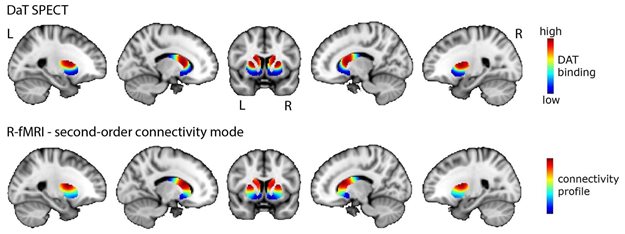
The striatum is an important region of the dopaminergic system, consisting of neural circuits that control many functions such as motivation, arousal, and movement. The region receives dense dopaminergic projections from other areas of our brain, such as the substantia nigra and ventral tegmental area, both located deeply in the midbrain. Alterations in the dopaminergic system have been implicated in various neurological and psychiatric conditions including Parkinson’s disease (PD) and substance use disorder. Nevertheless, most of our knowledge about the dopaminergic system is still based on preclinical work in experimental animals, as current structural and functional MRI approaches do not enable the study of dopamine-specific projections in the brain.
In this work, the researchers apply connectopic mapping –a novel resting-state fMRI-based method that enables characterization of multiple overlapping, fine-grained changes in the spatial structure of functional connectivity– and aim to demonstrate that one particular mode in striatum –at the level of individual participants– maps onto dopaminergic projections. The research group is led by professor Christian Beckmann from the Donders Institute and the department of Cognitive Neuroscience, in collaboration with researchers from the department of Neurology. They published their results in eLife on February 14th.
First, they show that this connectivity mode tracks dopamine transporter availability, a marker for dopaminergic projections, as revealed by DaT SPECT imaging. The striking spatial similarity between this resting-state fMRI derived connectivity mode and the DaT SPECT scan can be observed in the figure below. They then demonstrate that this marker is associated with symptom severity in PD patients and furthermore that its sensitive to acute dopaminergic modulation induced by L-DOPA, a precursor of dopamine, used for treatment of PD. Finally, they show that this biomarker is also sensitive to inter-individual differences in nicotine use and alcohol use in a population-based cohort.
The current study is the first to enable the fMRI-based study of dopamine-specific projections in the human brain and hereby provides an easily accessible biomarker for investigating dopamine-related functioning in both health and disease. This biomarker does not only have diagnostic and prognostic utility for Parkinson’s disease but could also foster insights into the neurobiological underpinnings of numerous other neurological and psychiatric conditions.

Publication:
Oldehinkel M, Llera A, Faber M, Huertas I, Buitelaar JK, Bloem BR, Marquand AF, Helmich RC, Haak KV, & Beckmann CF. (2022). Mapping dopaminergic projections in the human brain with resting-state fMRI. Elife, 11, e71846.
Related news items

1.5 million euro grant for research into earlier recognition of Parkinson's disease
27 October 2021 Researchers aim to improve identification of early symptoms and subtypes of Parkinson's disease with large international study go to page
New neural pathway in the brain discovered by Radboudumc researchers
25 October 2018 Researchers at Radboudumc have discovered a new neural pathway in the human brain by using various imaging techniques. This discovery may have an impact on the treatment of facial pain and other issues. go to page
Gatsby Foundation donates 10 million to improve Parkinson's care UK foundation supports rigorous healthcare innovation in the Netherlands
15 August 2018 The Parkinson center for expertise receives 10 million euros from the Gatsby Foundation. Thanks to this private donation they can implement a new healthcare model that focuses on the desires and needs of people with Parkinson's disease. go to page
Save the date for Radboud New Frontiers 2018: Betere zorg, netwerkzorg?
17 January 2018 After standard care, standardized care, and personalized care, network care will be care 4.0. But how exactly do you do that? Should we create new structures for it or is it just a matter of trust and ability to step back? go to page

